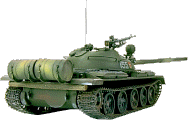Robert Thibault - World War II French Soldier, 1939-1940
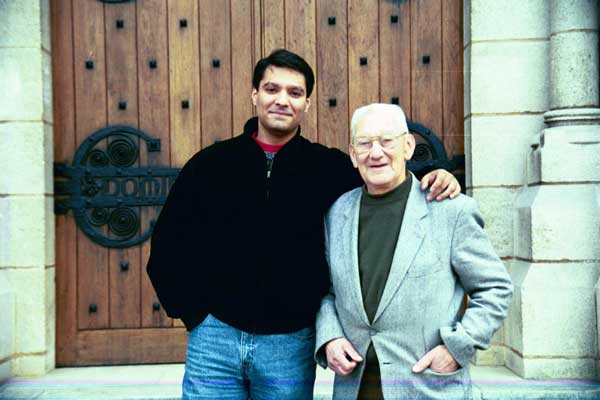
My Grandfather Robert Thibault and me at the Dorman WWI Chapel
Photo Lil Klein, 1993
October 26, 1997
I just hung up the phone. The red numbers on the clock read 5:03. When there's a red dot next to the number, it's the second set of 12 hours of the day. Right now the red dot is missing since it's the middle of the night, almost the morning. The real time is an hour earlier since daylight savings just went into effect a couple of hours ago while I was still awake.
According to the red numbers on the clock, the call from Paris to Atlanta came at 4:24. They always come in the middle of the night. If you don't want bad news, never pick up the phone in the middle of the night in this house. That's what happens when you have relatives spread out across the globe.
It was Mom calling with news I have dreaded for a long time. My Grandfather, Robert Thibault, must have died in his sleep - or at least I hope that he did and that he wasn't awake, sad and lonely in his last moments. He was probably alone in his bed at the hospital at the top of the hill in Coulommiers, five miles away from his own village of Saints. Saints is a pretty and typical French town he has known his entire life. He has probably never spent so many nights away from at one stretch in his life other than when he was away in the military in 1927 - 1928 or at war from 1939 to 1940. Mom just got the call from the hospital half an hour ago. So then it would have been around 9 am adjusted time for Paris that she must have found out. Now she's on her way to the hospital. It's raining and thundering outside and for some reason, I imagine it's that way in France too right now. Every few minutes a lightning strike frightens away the night. Somehow, it's very appropriate weather for this kind of news. There's a perfect metaphor in here somewhere. I'm just too tired to figure it out.
Robert Thibault was an amazing man who happened to be my Grandfather. I wish I had had more time to get to know him. That is to get to know more about him before my life started. I found the old black and white and sepia photos on this page some time after he died. He died in 1997 at the age of 90. I wish I had had them earlier so that I could have asked them about them. As it stands I asked him to reminisce a bit for me in 1995 or so. I got a bit of it on several microcassette tapes I made for posterity. And so part of that follows along with some of what I have reconstructed by hitting history books.
2007 Update: I am also very grateful to the Deputy Mayor Monsieur Golab of the village of Saints who provided me with wonderful access to some of the photos of the town's history in April, 2007. 2009 Update: I have just received my grandfather's official military record through 1935 as well as that of my great grandfather and both great granduncles. I also got to meet my cousins Denis Regnier and Philipe Regnier (and their beautiful families) in Meung-sur-Loire who were kind enough to share some of my great uncles WWI photos. I will try to add more as I get more time.
A Family Affected by War
In World War I alone, the French had more KIAs than we have had in all of our wars over the past 225+ years. It seems as though every single French man between the ages of 18 to 45 or so served. My great uncle Alcee Thibault died in the war leaving behind his widow and an infant daughter who he never saw and vice versa. My great uncle Raymond Thibault lost one of his eyes. He was in the war from the first day to the last one and wasn't demobilized until several months after the war ended: a grand total of four years and five months. My great grand father Henri Thibault fought the whole duration of the war as well. He was a bicyclist of some sort. He came back unwounded, but won the Croix de Guerre (France's great military honor). On my grandmother's side, her brother in law Maximillian "Titi" Regnier fought in World War I and was part of the post-war occupation force in Germany. Our village of Saints was used as the airfield for the US 1st Pursuit Group during the Chateau-Thierry sector offensive - inarguably the most intense combat location for the US air service during World War I. The village was just inside the line marked by where the Germans got closest to Paris in all of World War I.
My grandfather Robert Thibault served in WWII and also won the Croix de Guerre. Apparently 40 of the 66 men he was with became casualties on the first day the Phoney War became a real one. My sole grand-uncle Jean Gue fought in World War II and was a prisoner from 1940 to 1945. The French had almost as many killed in the six short and intense weeks of combat against the Germans than we did in four and a half years that we were in WWII. Mom, my grandmother, my uncle and great grandparents were all refugees.
All of this happened over just 31 short years. And all this from a population that is only one fifth of ours.
My uncle was in the French Algerian war. My cousin Alain Thibault was a French paratrooper. In fact, of the males in my family, I have the dubious honor of being the first one not to have been in the French army and my cousin and I are the first males not to go to war. My great great grandfather Louis Guyot fought the Germans in the Franco-Prussian War. My great great grandmother had her house occupied by the Germans in 1871 and possibly in 1914. She was delighted to have Quentin Roosevelt stay with her in 1918. Tragically he died while he was staying with her. One of my other great great grandfathers was a man named Narcisse David. As far as I can tell he was nicknamed "the Mexican" (well before Brad Pitt) because he fought in Mexico in 1850 or so whenever that war was. I am still trying to confirm or correct that.
1995, Saints, France
The first thing that always strikes me when I see my Grandfather is that he's so little. At 5'2", he's an amazingly small guy for the giant of a man he used to be. He still has powerful forearms, built the old-fashioned way through sweat and hard work, that are almost twice as big around as my own. His short snow white hair points straight to the sky in the fashion of a crew cut that has been his style since 1928. Every year he becomes more and more stooped over; he ambles almost in a slow shuffle, his body a worn relic of yesteryear. But it's still him under all that. The change is only somewhat real. Inside his mind is still alert, his political opinions still sharp, and his way still set in stone, with a stubborness caloused through years of use. Every Grandfather is always the ideal composite of what a Grandfather should be. This man is no exception, though he wasn't always that way. He used to be the big boss, the business man running the small family concern which makes all kinds of bricks, tiles and other earthen construction goods. Now he's a man who's main obsession is my Grandmother who passed away recently. She's left him after she practically reinvented his mission in life. She used to take care of him day in and day out. I don't know what the real story is, but I've heard that he almost didn't know she existed sometimes. But when she started getting sick in the late '70s, his role changed from the big boss to the caretaker. The man who had never cooked a good meal in his life started having to cook not only for himself, but also for his wife. The man who had probably often ignored his wife was now a man devoted to taking care of her. Each passing operation or surgical procedure inflicted on her debilitated her just a big more and made them more codependant. He provided the physical care and his payback was my Grandmother's affection. The last couple of years of her life, he took care of her every need.
My Grandfather and I always speak in French since he doesn't speak English. My French is that of an illiterate, and I write very poorly in the language as well, having to rely on my word processor to underline every other word in red to point out my errors so that I can fix them. But my spoken French is good enough to have a detailed conversation even if I struggle from time to time on technical terms and the infinite mystery of French verb conjugations. French slang trips me up easily, but luckily my Grandfather doesn't use it often. I prompt him with one question after another, usually to get his voice on tape recollecting the stories that he has told me before. That's a bit of the problem. He knows that he's told them to me before and he leaves out most of the details, giving me the headline overview.
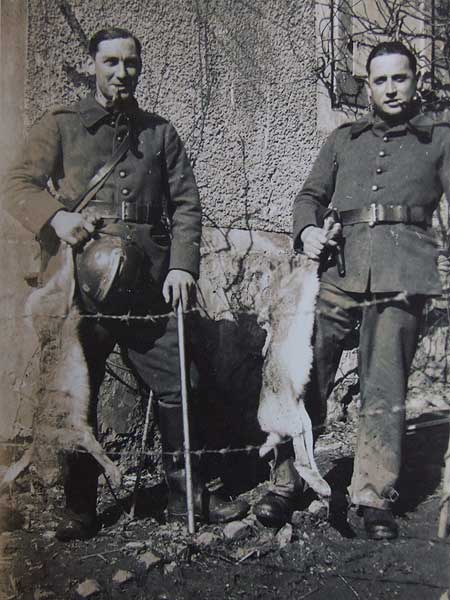
Robert Thibault (left) after hunting with a friend during the war.
Ever since Grandmaman passed away a few years ago, it's almost always just the two of us at the dinner table. Grandpapa starts getting nostalgic as we eat, talking about this and that. That's my cue to go upstairs and grab the micro cassette recorder and start asking questions. The little four legged white table where we eat is the same one that has occupied the kitchen ever since I have known it. Everything in the kitchen is scaled to small people - French people. I have to lean over to grab things from the table, and I bump my knees when I pull my chair up to it. I see it in old 8 mm films and on 20 year old slides. It's a permanent fixture in a permanent house. Nothing ever changes around here. The little chairs which are sized perfectly for the French side of the family look almost like they are for kids in elementary school. The vinyl on one of them has split, undoubtedly from Grandpapa standing on it all of the time so that he can use it to climb up to the tops of the cupboards to get his different cans of food and what not. He's still a pretty tough guy for an 88 year old man. The kitchen has one window, flanked by green metal shutters like all of the other windows in the house. Just outside the window is a little ledge where Grandmaman used to set her apple pies to cool off. I think of her every time I look out that window.
The French side of my family has served a lot in the military. We have a photo of my great great grandfather Louis Guyot in uniform in 1870. He died in 1892 at the age of 43, so he must have been 20 or 21 when he was at war. He served in the Franco-Prussian War. I believe, though am not sure, that Louis Thibault, my other great great grandfather also served in that war. Then, as mentioned previously, my great grandfather Henri and his two brothers Raymond and Alcee served in WWI. The youngest brother Alcee Thibault was killed May 9, 1915 leaving behind a widow and a little daughter Odette Thibault born in 1914. He probably either saw her for just a few weeks or never got to see once in her life. My eldest grand uncle (in law) Maximilian Regnier of Meung sur Loire served in WWI as well. I think it was on the tail end because I know that he was part of the occupation force in Germany in 1919. My grandfather Robert Thibault and grand uncle Jean Gue served in WWII. My grand uncle Jean ended up becoming a POW in Germany for five years. My grandfather joined the Resistance in a very light capacity as a truck runner toward the end of the war. My uncle Claude served in the French-Algerian War. My one male cousin was a paratrooper Alain, but didn't have to go into combat. In fact, I think he had a great time in Germany during the Cold War jumping out of helicopters, smoking Gaulois Blondes and being a French goodwill ambassador to as many local frauleins as he could meet.
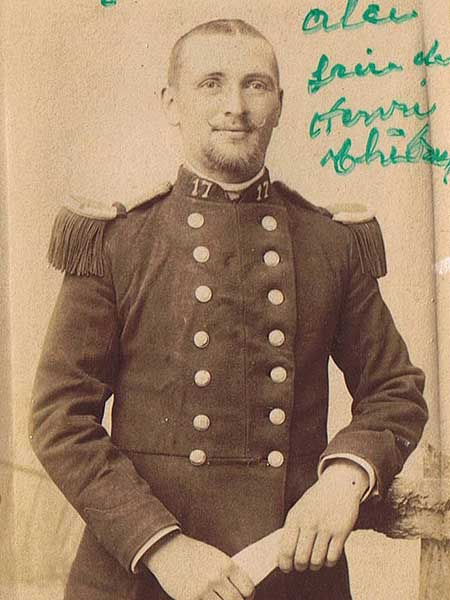
Alcee Thibault, about 1914.
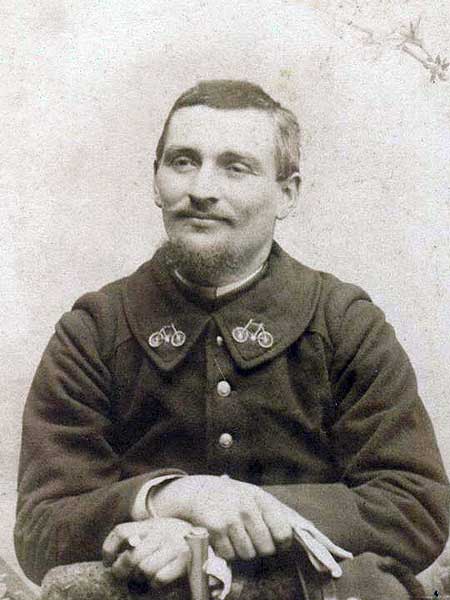
Henri Thibault, about 1914.
So other than me, all of the males on the French side of my family that we know of have served in the military. And all but my cousin and I have served in war. It seems to me that every one of those four wars was completely and easily avoidable but for the egos of their leaders - Napoleon III in the Franco-Prussian War, the Austrians in WWI, Hitler in WWII, the French in the Franco-Algerian War. But today it's my grandfather's experiences that I want to ask him about.
"So what is your first memory?"
"When I was young, I was at school and I was four years old. [Another memory was when] my father returned from the war, so I was seven, no more than that."
I prompt him with one question after another, usually to get his voice on tape recollecting the stories that he has told me before. That's a bit of the problem. He knows that he's told them to me before and he leaves out most of the details, giving me the headline overview. "Tell me about World War I..."
"How old were you?"
"I was 11 or thereabouts, until the age of about 14 or so. There was the airfield, with six airplanes; they were Cygognes." The storks. France still flies aircraft with the Cygognes insignia and are as immediately recognizable to the French as the Flying Tigers are to us. The one other unit which is as well known would be the Sioux warrior-emblemed Lafayette Escadrille, with which many Americans served in WWI before the US joined the war. The Cygognes today fly nuclear armed Mirage 2000N attack jets, a far cry from the Spad XIIIs of eighty years earlier. A typical squadron would have had a strength of 12 to 18 aircraft, so clearly the French units were being hit hard. There was just the one French squadron on the field at the time the Americans got there. I'm still trying to identify which one it was.
"There was an aviation terrain here, with the big American fliers." He's referring to the rolling green field out in back of the house maybe a couple of thousand feet from where we are speaking at the moment. Today all that remains is a slight undulation in the plot where the landing strip used to be. "I used to go there with my friends. We were all about 11." The rest of the story, which he kind of left out, was that they would go watch the "big" Americans with their shiny new aircraft. I always imagine the three of them crouching shyly behind some dune-like mound, watching the flyboys practice their marksmanship. One day one of the Americans asked my grandfather and his budies if they wanted to try to fire the big guns. Grandpapa said yes as did the others. The American warned him about the recoil, but that means little to an excited 10 year old who's never fired a gun. He did and the thing knocked him back to the ground. "Want to try again?" "Of course," grandfather responded; he never looked back after that. Like many Frenchman, he had a huge gun collection of match weapons that he used strictly for competition along with others that he used for hunting. I'm not sure why the French need so many guns, but they seem to have one for each occassion. I'm surprised that Benetton hasn't started marketing more colorful weapons. "Here, we have a dainty .357 magnum with an easy trigger for the most delicate high society women. Note that the barrel is fuscia." Then again, I suppose that if he happened to see a deer on the road in front of him, he could just reach into the trunk of his Citroen, rummage through the rifles in the back until he found the right calibre weapon. No use in wasting an expensive bullet when a medium priced one would do just fine. Later he got good enough to where he competed at both a national level and at an international level.
"Tell me about when Madame Roosevelt came to visit." Edith Roosevelt was Teddy Roosevelt's widow. She came to France in February, 1919. Teddy had died the month before. Her son Quentin had died in July while he was based in Saints. Of Teddy's six children, three sons and one daughter served in France and one son served with the British in the Middle East. All three sons who served in France won the Croix de Guerre. Two were severely wounded and, as mentioned previously, Quentin was killed.
"It was at my Grandmother's in Mauperthuis." Mauperthuis is the adjacent town exactly 1.1 kilometers away according to the very precise French signposts. The architecture is the exact same as that of Saints and pretty much any other town: absolutely charming and virtually unchanged for two hundred years. With 400-500 people, Mauperthuis is so small that it makes Saints look like a megalopolis. As far as I know, the two main hang outs are a little restaurant/bar in the center of town and a café that catered to my cousin Murielle and her buddies when we were all teenagers back in the 80s. But that town also holds a great deal of history including the chateau of D'Artagnan, also known as the fourth musketeer of the Alexandre Dumas stories. He was, in fact, a real person.
"Roosevelt's son's name was Quentin," my Grandfather continues restating things that he has told me in the past, though this time it's for the record. "He was killed when he was flying out here during the time that he used to stay at my Grandmother's." That's where Roosevelt and another pilot were quartered while they were in Saints. "Madame Roosevelt came to Mauperthuis, to France, and came to our house. There was an interpreter with her, and she wanted to see where her son used to stay. She came inside and looked at his room. There was a photo of him standing next to his aircraft." It was the Nieuport 28 airplane in which he would be shot down and killed.
"Did you ever meet him?"
"No, I can't say that I ever knew him," he said hesitantly. I had always thought that he had and found myself disappointed for some reason that he hadn't. From there Edith drove to Chamery to visit Quentin's grave. Later she personally paid to have the village of Chamery build a commemorative fountain in his honor. I don't know any more details of her trip except that she continued on to Italy after France and arrived there by the end of February.
I grab the margarine to put on my huge chunk of French bread. "Hey, watch out for the margarine. It'll give you cholesterol. One should use everything and abuse nothing. You understand? Voila." He's only half kidding.
"Yeah, but you'll have more fun if you use nothing and abuse everything," I retort with a smile. He doesn't get it. Come to think of it, I don't either, but it seemed rather funny at the time. I push the recorder over a little closer to him hoping it won't distract him.
[Note from 2008: This whole story has intrigued me for years. I did a lot of research from around December, 2007 to July, 2008. In fact the research is still on going. It turns out that Saints was, for two months, the exclusive home of America's first fighter pilots. There were the four squadrons of the American 1st Pursuit Group - the 27th, 94th, 95th and 147th Aero Squadrons. They arrived in Saints flying rotary engined Nieuport 28s and left flying faster, better and more powerful Spad XIIIs. These heroic pilots were the who is who of early American combat history and included Eddie Rickenbacker, Frank Luke, Joe Werner, Quentin Roosevelt and at least 70 others. They went up against Germany's best fighter squadrons including the Richthofen Circus. Quentin Roosevelt was shot down July 14, 1918, making headlines around the world and becoming America's most famous World War I casualty. This July 14, 2008, we organized a commemoration of these first American combat pilots. Two other squadrons were also in Saints before the 1st Pursuit Group arrived. The American Observation Group 1st AC included the American 1st and 12th Aero Squadrons. See the links at the bottom of this article for more information.]
At 12 years I passed my certificate of studies of the first level with honorable mention. Just like you all. There were others who never did their certificates. They become cow farmers and so on."
My Grandparents met at a wedding somewhere near Meung sur Loire. She was singing and he was playing the violin. They were paired up together as part of the wedding party. And then, as a joke, the groom and his father told my grandfather that it was customary for the male to kiss his counterpart. And so he did. My grandmother turned away blushing, a moment that has been caught in black and white by the photographer lens in one of the group photos of the whole wedding party. But something must have clicked, because my grandfather started courting her, by bicycle, riding 120 kilometers each way from Saints to here and back during selected weekends.
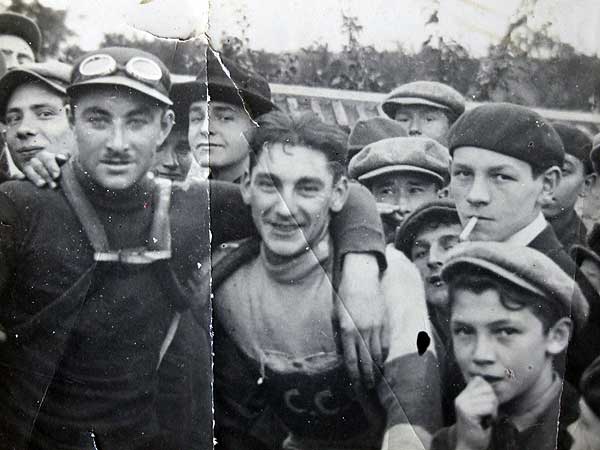
Robert Thibault (center) after having won a bike race.
At some point he gathered the nerve to ask for her hand in marriage and asked her parents permission. He approached my great grandmother first. "I don't know. Go ask her father." And he did. My great grandfather's response was the same. "I don't know. Go ask her mother." So they got married.
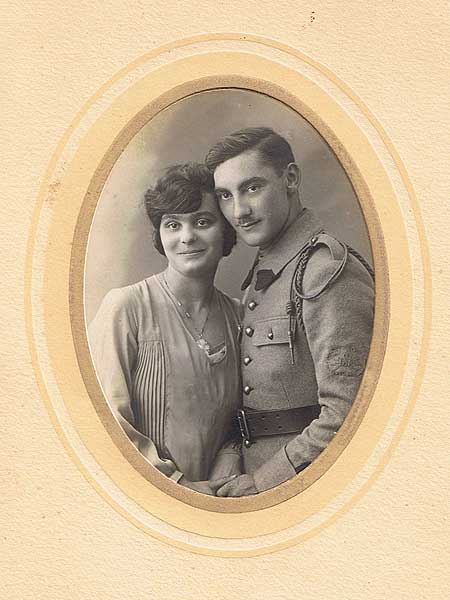
Cecile and Robert Thibault engagement photo.
"But when I married Cecile, we didn't have any money. Until 1933, it was Maman [my grandmother] who knitted to pay for our food. The little that I earned went right back into the factory. I used to buy machines, equipment, etc." He's talking about the brick and tile factory that's now my uncle's but which was his. "We used to carry material back and forth with wheel barrows. That's how we started out here, with wheel barrows. Now when I see the forklifts (and all of the modern equipment), it brings back memories."
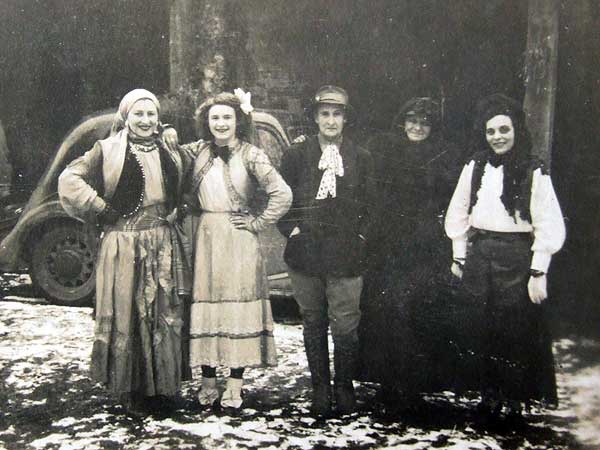
Cecile Thibault (at right) post-war.
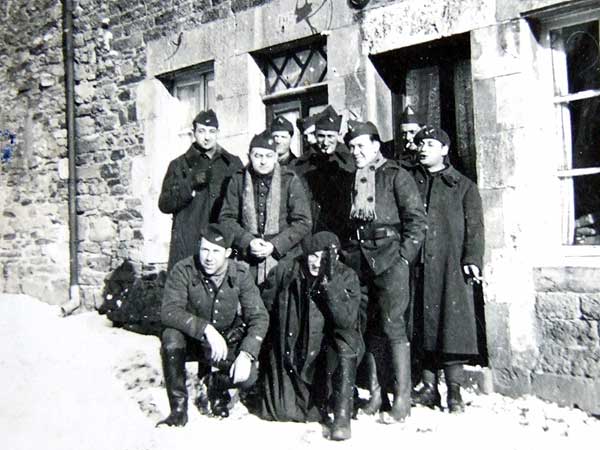
Robert Thibault and men from his artillery unit, 1940.
"So tell me about the first two sons you had."
"After two and a half, three years, we had a son, Roger. He only lived six days. He died and we never knew what happened. And... There was a doctor, a Greek I think, a doctor from Paris, said that there is nothing we can do for him, and he died the next day. Three years later, we had another. Pierre, we called him. He got cholera. He died too. We never figured out where he got it from. He would drink water and it would all come out the other end. He couldn't retain anything. So after that we didn't want any more kids. We were tranquil for five-six years," but too depressed to want to have any more children, at least for a while. Grandpapa gave up playing the violin, one of his great loves and the reason for his meeting Grandmaman in the first place. "Then things started going well with the factory. We were succeeding. Cecile said, 'Shouldn't we have some kids. We're not going to do all of this only to leave all of our money to the government, are we?' We had Claude in '36. And then seven or eight years later, we ordered you too," he says, pointing at Mom, though she was actually born the month before Pearl Harbor in '41.
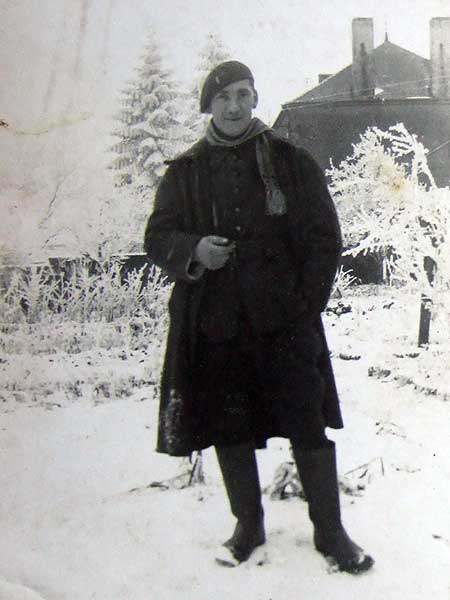
New Year's Day, 1940.
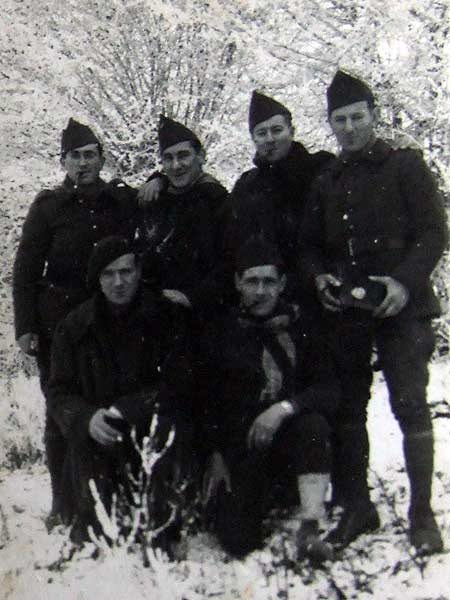
New Year's Day, 1940.
"I used to go fire in Weisbaden, in Germany, when it was occupied. I was always one of the top five foreigners. We had five shots, and that's it." Grandmaman and Grandpapa had two friends from Germany named Otto and Kate. "Otto and Kate used to come and visit us. They would comefor matches here, and then their team would reciprocate, and we would go over there. One time, when it was our turn to compete over there, they had our whole group out for dinner, and I tell you, the beer kept on flowing. More beer, more beer, someone would say, and it would arrive. Needless to say, we did really poorly the next day. Ho, ho, they really beat us. But next time, when it was their turn to visit, we took them out and had the Champagne flowing non-stop. We more then got them back that time. Of course, we had good laughs over the matter every time we got together after that."
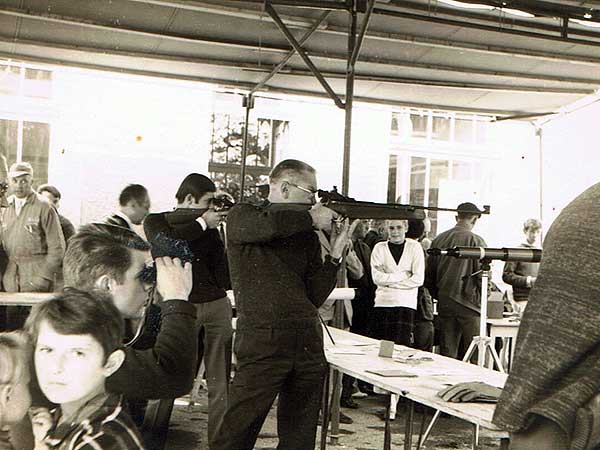
Robert Thibault in match-competition post war.
"In 1972, when Claude [my uncle] was ready to take over the factory. I said, 'no my boy, when I'll have worked to pay everything off, then you'll take the factory.' So when he took over the factory, he didn't have to spend a sou. He just had to work. Voila." He uses the word 'voila' to mean 'so that's the way it was'. He continued talking about the factory. "I also gave another 10,000 FF, which was a lot at that time."
We end the conversation for now.
Saints, France
Saints (pron. "Sain" with a very nasal "n") is a beautiful little town. It has a total population of about 900. Actually, it's not a town; village is more like it. The average home must easily be 200 years old. Postcards dating back 90 years show no change whatsoever, except for now the road is paved. Its population peaked in the 1200s at about 5,000 persons. It has one main street (two lanes, one lane each way), no traffic lights, one church built in the Romanesque style dating back to 1000 A.D. or so, assorted boulangeries, episseries, a post office, a few recently added white light street lamps, and a stream on the outskirts. That's the central part of town. The town only has perhaps 100 or so buildings. The buildings in the center of town are two or three stories high. They skirt the central carefour - which is called the Place de l'Eglise. As the name implies, it's the plaza that borders the old Romanesque church. Each building has roofs that sag gently toward the center, topped with old oranged baked clay roof tiles. Some have been darkened by the passage of years and others look recently patched. The buildings are all stuccoed with windows that are of differing levels, probably reflecting floors that step up or down in harmony with the roads. Vines with thick lush green leaves spread across the facades to decorate and even to insulate the houses they cover. Window shutters that are opened every morning and then shut tightly ever night flank every window on every home. They are colored green, red, orange, white, gray, aqua and pink. The colors aren't mixed and matched on the same building except for in one case where the five windows each have a different colored pair. But the ensemble of colors on the shutters, the stucco and green facades and the different color roof files makes everything that much more romantic and picturesque. Then outside of town are acres and acres of mostly flat farmland. The nearest communities are 1 kilometer away in one direction (Mauperthuis), and about three in the other direction. My Grandfather built his house with the help of my uncle and my great grandfather in 1952-1953. It used to be the last house heading out of town back toward Coulommiers. Now my aforementioned uncle's house, which is next door, is the last one. While Saints is not as picturesque as the little Provencal villages perched on top of every hilltop, getting in and out is immensely more easy and practical as the the main road comes in and exits both straight and level.
The house where Grandpapa was born is right next to the church. My Mom and uncle were also born there as were several previous generations of Thibaults. My great grandfather apparently owned quite a bit of property, which, in accordance with French tradition, he split evenly between my grandfather and his sister, the alcoholic. She sold and spent all of her inheritance to support her alcoholism. My grandfather got the factory, the family business for seven generations by the time my grandfather took over. When my cousin takes it over from my uncle, it will be nine generations.
Saints was also the closest "Les Boches", the Germans, got to Paris during WWI. The famous story about the Renault taxis taking the extra troops to the front to stabilize the collapsing French line is the reason that the Germans didn't get further past Saints. My grandfather, who was a French champion marksman on several occassions, first learned to shoot from the American airmen who flew Spads out of the airstrip which used to be behind the village.
As I said, my grandparents built the house in 1952-1953. Before that, they were living with my grandfather's parents - Henri and Henriette - near the village church in the house my great grandparents owned. It's a modest two story home with a small coterie of shacks and a few acres of farmland in back. My grandparents had the upstairs floor, my great grandparents the downstairs. My grandparents and Mom and uncle moved out to make room for my grandfather's sister Suzanne. She was to get the house in the inheritance and my grandfather was getting the factory. I'm not sure why she and her family - husband and five kids - were moving back in before my great grandparents passed away, but they did. I have a photo of my grandfather, his mother, his little sister and his big sister Suzanne, who must have been about 12 at the time. Suzanne was a pretty girl as a child, but later she put on a great deal of weight - not common by French standards. Henri and Henriette moved upstairs to make room for Suzanne and her family and my grandparents, Mom and uncle moved out to Madame Gobard's house while their own new house was being finished up.
Meung sur Loire and Orleans, France
My Grandmother Cecile was from a village named Meung sur Loire located just south-west of Orleans, itself located south-west of Paris.
Orleans, and therefore New Orleans, are named after the Roman emperor Lucius Domitius Aurelian (from which came "Aurelianum"). He was the one who rebuilt the city whose name was changed over the years to Orleans. Incidentally, the patron saint of the two cities is, of course, Joan of Arc who liberated the city against the English during the Hundred Years War.
Meung sur Loire has one street and consists pretty much of farms, at least the way that I remember it. And the farms are strung in between the river and the little road running roughly parallel to it. I had a grand-aunt who lives there along with other assorted relatives, and thus felt really stupid that we didn't have time to go by and say "hi" last time I was there. The lack of time was more an excuse than anything else. Truth was that I didn't know if she would recognize me or be ready to greet visitors, etc. By the time I had my all to hasty decision, it was too late. I don't know if I'll ever get to go back to the several hundred year old farm house where my Grandmother and all of her siblings were born. I suppose that my Great-Grandfather was killed there, kicked in the head by a horse whose shoe he was trying to change. Not a very appealing way to die. But that was the way of life on the farms in those days. When I went for the second to last time several years ago, there were five older relatives. One had just died. The last time I went, three more were gone: Grandmaman, her brother Mon Oncle Jean, and her brother in law, Maximilian Regnier, or "Oncle Titi" as we used to call him.
We called Maximilian Regnier "Oncle Titi". When I last saw him, was in his mid-90s. He was a tall and thin man, now walking quite slowly assited by a wooden cane. His wife, my grandmother's eldest sister had just passed away recently. He was practically deaf but still quite robust for his age. He was quite a handsome man in his younger days. Several photos of him from that period show him in training, alread sprouting a thick dark mustache and in white smocks with the rest of his unit and then later with a solitary stripe on his lower sleeve - no doubt indicating that he was now a private 1st Class. Another wartime studio photo taken in Paris shows him standing next to a folding bike, legs wrapped in leggings, a metal helmet on his head and a rifle strapped to his back. His eyes peer earnestly from the 90 year old photo. During the German offensive of 1918, his unit fell back to Pierrefonds and bivouaced at the foot of the beautiful chateau of Pierrefonds. The details after that are missing, but on November 12, 1918, the day after the end of the war, he was in the Vosges in Lorraine. Being on the marginally victorious French side, he ended up the war taking German prisoners and helping to occupy Germany. He was sent to Mainz, Germany as part of the occupying force and arrived there December 17, 1918. He would remain there until he was demobilized in September, 1919.
Jean Gue, my grandmother's younger brother and the only son in the family, served in the French Army during World War II as did my Grandfather. My Grandfather was able to demobilize and to join the Resistance. I always called him "Mon Oncle Jean" since that's they way my mother referred to him. It was never just Oncle Jean, but always Mon Oncle Jean. And my great aunt was always Ma Tante Yvonne.
Mon Oncle Jean wasn't so lucky as my Grandfather and served for four years in a POW camp in Germany. When he came back finally, my grandparents and uncle and Mom left Saints in the middle of the night to go to Meung-sur-Loire to see him. It must have been an incredibly overjoyous reunion. Mon Oncle Jean's laughter was the contagious kind and he spoke with an ever present twinkle in his eyes, the kind that remind me of my own uncle's ever present smile. They must have shared some common gene. I always think of Marguerite Duras' "The War" when I think of this generation, twice removed from my own. They do a good job of not telling us how easy we have it. Too bad that we usually don't stop to think about it. For them, the remainder of the war has been turned into a topic of nostalgia, best discussed while enjoying a cup of coffee or an after lunch digestif that's probably half as old as I am. The conversation was always "You remember so and so..." or "What about the time that such and such happened?" I wish that I had recorded those conversations since now they're gone forever. All I have left are all too few photos, and some all too rapidly fading memories. Soon my memories will be nothing more than the vaguest of impressions. My French family used to remind me that they thought that Grandmaman hung on for as long as she did so that she could see me, her favorite grandchild, again before she passed away. And I wished that in return for waiting for so long that I could have shown her my own child which I think that she also wanted to see so badly.
The one whose house we passed by was Ma Tante Yvonne's, grand-uncle Jean's widow. Tante Yvonne and Mon Oncle Jean never had any kids, at least none of which I know. It's quite probable that they had one or two who died in infancy, just like Grandmaman and Grandpapa. Grandmaman and Grandpapa were heart-broken and didn't plan to have any more kids. Perhaps Tante Yvonne and Mon Oncle Jean were the same way but succeeded. In any case, there is a forty-something couple who live at the adjacent farm next door, and they kind of became the adopted kids, takinig care of my relatives in their old age. In return, the two of them decided to pass their farm house on to the forty-somethings. So now that Tante Yvonne has passed away, another root in the family's history has been abruptly truncated forever.
Next Page
Robert Thibault, French Soldier
Robert Thibault, French Soldier, page 1, 1907-1997
Robert Thibault, French Soldier, page 2, 1928
Robert Thibault, French Soldier, page 3, 1939-1940
Robert Thibault, French Soldier, page 4 - Liberation of Coulommiers, France, August 27, 1944
Francais
Italiano
Espanol
Deutsch
Related Links
- United States Air Service in World War I at www.usaww1.com
- My travelogues of France, USA, Canada, UK, Japan, Saudi Arabia, etc.
- Thibault Villa
- 3rd Armored Division History Foundation
Keywords
12ème RA 1940
12ème Regiment 1940
12ème régiment artillerie 1940
8e Division
8ème Division D'infanterie
12ème Régiment d'Artillerie (3ème Armée, 8ème Division D'infanterie)
8ème Division D'infanterie infanterie
Phoney War
French army, 1939-1940
EORs, Eleve Officiers de Reserve
Quentin Roosevelt
1st Pursuit Group
American Air Force in France
American Air Force World War I
3rd Armored Division
Robert Thibault
Alcee Thibault
Raymond Thibault
Louis Thibault
Louis Toussaint Thibault
Louis Guyot
Titi Regnier
Regnier, Meung sur Loire

 Home
Home Hearts of Iron
Hearts of Iron




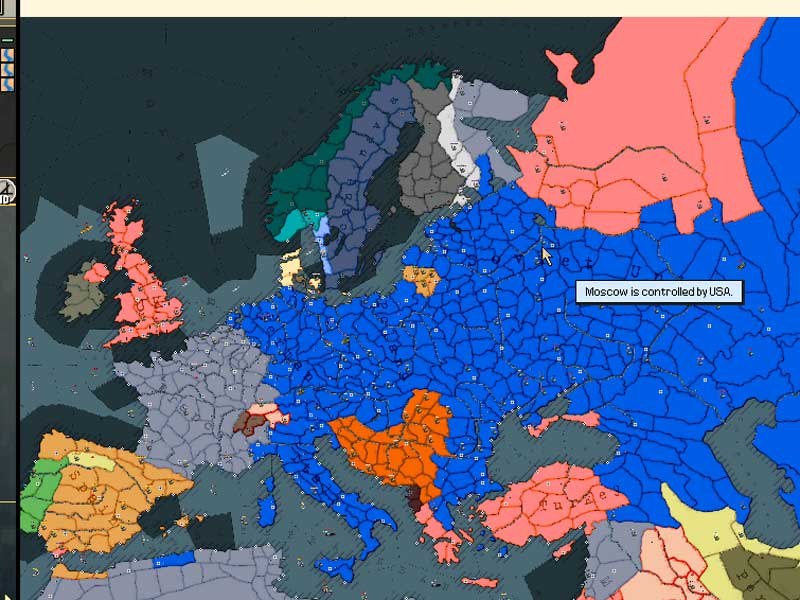



 French Military Victories...
French Military Victories...